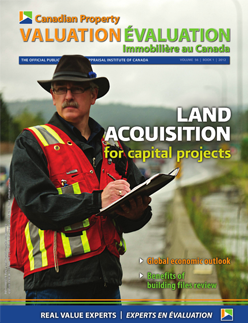Land acquisition for capital projects
Canadian Property Valuation Magazine
Search the Library Online
By Doug Fourchalk, RI, FRI, SR/WA
Principal, DM Fourchalk Property Consultants Inc.
This article is reprinted with the permission of the Real Estate Institute of British Columbia.
What is a right-of-way agent?
Here in British Columbia, where I practice my profession, I am often asked what I do for a living, which tends to leave me at a loss for words. “I am a right-of-way agent, generally contracted to government agencies to acquire property or partial interests in property,” albeit precise, is not the easiest or the most understandable way to describe my occupation to others. In fact, most people do not even realize there are right-of-way professionals out there, busily delivering property to enable the construction of just about every major infrastructure project currently underway, including the Port Mann/Highway 1 project and the Evergreen Line Rapid Transit project. We also work within railways, utility companies and Crown Corporations, managing existing property holdings and interests.
There is a small and specialized group of right-of-way agents operating in the Lower Mainland and the province of British Columbia who are fully engaged in delivering these projects. There are a few reasons why the group is small: first, as noted above, not many people realize the opportunity available for a career in this field, so they do not consider it when reviewing career options. This is particularly evident when reviewing the direction of graduates from the University of British (UBC) Urban Land Economics program. Second, and most importantly, this field has become highly specialized in recent years, requiring the practitioner to have a more than passing knowledge in the fields of engineering, law, appraisal and negotiation. The image is long past of the right-of-way agent as a straight ‘negotiator,’ driving from landowner to landowner with cheque book in one hand and a roll of plans in the other.
Not only must a right-of-way agent be able to properly decipher and explain construction plans in a way that is coherent and relevant to the landowner, the agent must be able to accurately interpret the legal agreements and documents that are presented to the owner and to engage the owner’s lawyer or representative in reviewing or recommending revisions to the documentation. Additionally, the agent must be able to work with appraisers, both the agency’s and the owner’s, to ensure that each appraiser has a solid understanding of the construction program, as well as the perceived impact to the property. This requires a keen understanding of the appraisal process.
Land acquisition in BC’s Lower Mainland
In the Lower Mainland of British Columbia, it has become increasingly rare to find capital projects being constructed in undeveloped areas. With the increase in density and development of land, such projects have had to expand through developed areas where impact to property – both residential and commercial-industrial – is significant and complex. This compels the agent to draw upon a broad depth of experience to conduct a detailed review of ownership, charges on title, tenancies, zoning, and official community plan designations, in order to have a full understanding of what impact the project may cause, what solutions may be available to deal with the impacts, and whose interests are being affected.
These types of acquisitions are commonly termed ‘expropriations,’ which refers to the legislated ability for the government or agencies operating in the public’s interest to acquire land for a public benefit (for roads, transit, sewers and water mains, or gas lines). Simply put, expropriation is the legal process by which agencies can acquire property for public benefit.
Unfortunately, the word ‘expropriation’ sounds very intimidating, and the utterance of this word can send an owner running for the hills (or at least for his or her nearest reporter or politician). I have actually had clients who issue strict instructions never to utter the e-word!
If an owner enters into a consensual agreement with the agency, it would not be classified as an expropriation. In most cases, a consensual agreement is achieved. However, an agreement may not be reached for reasons such as: the owner is simply not willing to enter an agreement (either for financial reasons or objections to the project); all of the potential claims cannot be properly quantified prior to construction (business loss); or because the property must be delivered by a certain date to preserve the construction schedule. Rather than considering expropriation as an intimidating process that should be avoided, it should be considered as a tool that allows the agency to acquire the necessary property in time for construction, while preserving the owner’s right to make a future claim. By far, the most common reason for expropriating a property is to preserve the owner’s ability to make a claim later, as the full impact on the property could not be determined prior to construction.
Striving for cooperation and fairness
I often joke that I have never met an owner who was happy to see me, despite my good looks and pleasant demeanour. If I knock on a homeowner’s door, it means that he or she is going to be asked to sell all or a part of the land – something not expected or planned for. Unfortunately, it is often assumed that agents representing the agency will be attempting to acquire the land at the least possible price that can be negotiated. In my experience, this could not be further from the truth.
Generally, most agencies will support a settlement as long as it is properly supported with an appraisal or other evidence and it conforms to accepted compensation principles. These principles can be found by understanding the provisions of the Expropriation Act as well as other pertinent legislation, and the up-to-date case law governing compensation decisions from either the Expropriation Compensation Board or its successor, the Supreme Court of British Columbia. A good right-of-way agent will fully understand what is or may be compensable and can work with the owner or his or her representatives in an open, cooperative manner to achieve the best possible agreement between the parties. The bottom line is that, if we have done our job properly, whether we have completed a consensual agreement or were compelled to expropriate, we will have overcome that inauspicious start to end with both parties feeling satisfied with the transaction.
After a particularly difficult and protracted negotiation, I once had a prominent lawyer tell me that the sign of a good deal is that both parties go away unhappy. While that certainly occurs, I prefer to pursue the opposite. One of the ways I attempt to do this – and this is echoed by many of the more successful right-of-way agents, lawyers and appraisers with whom I commonly work – is to take a reasonable, even-handed approach to solving issues; that is, to take a similar position when representing either an agency or an owner. While a win-win proposition will not likely occur, both parties will leave the negotiation feeling that they have been dealt with fairly and will be accepting of the result.
About the author
Doug Fourchalk is a current Director of the BC Expropriation Association, a past-president and executive member of Chapter 54 of the International Right of Way Association, and an active member of both the Real Estate Institute of BC and the Real Estate Institute of Canada. He has been active in the real estate sector for the past 16 years, specializing in acquiring rights-of-way and other interests in land on behalf of government entities, private corporations and developers.
-30-





